#Sir Humphrey Gilbert
Explore tagged Tumblr posts
Text




























Sir Humphrey Gilbert established the first English colony in North America, at what is now St. John’s on August 5, 1583.
#Narrows of St. John's Harbour#Cabot Tower#Signal Hill#travel#vacation#summer 2015#original photography#cityscape#architecture#landmark#St. John's#Newfoundland and Labrador#Sir Humphrey Gilbert#first English colony#5 August 1583#anniversary#Canadian history#white colonialism#boat#ship#tourist attraction#Newfoundland#Terry Fox Zero Mile Memorial
11 notes
·
View notes
Text
THIS DAY IN GAY HISTORY
based on: The White Crane Institute's 'Gay Wisdom', Gay Birthdays, Gay For Today, Famous GLBT, glbt-Gay Encylopedia, Today in Gay History, Wikipedia, and more … October 29
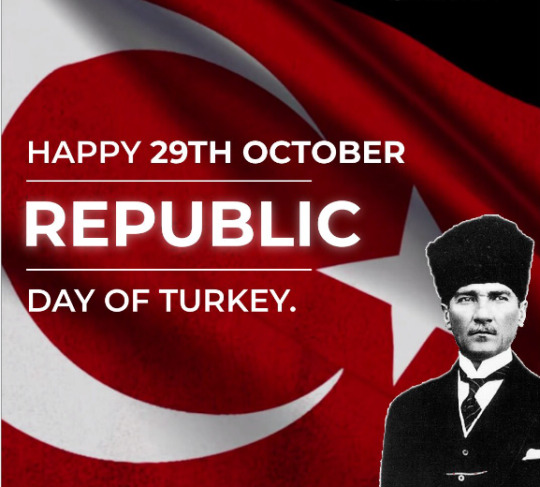


Iolaus and Heracles mosaic
1000+ BC – Iolaus was a Theban divine hero, son of Iphicles and Automedusa. He was famed for being Heracles's nephew and for helping with some of his Labors, and also for being one of the Argonauts. Through his daughter Leipephilene he was considered to have fathered the mythic and historic line of the kings of Corinth.
As a son of Iphicles, Iolaus was a nephew of Heracles. He often acted as Heracles' charioteer and companion. He was popularly regarded as Heracles's lover, and the shrine to him in Thebes was a place where male couples worshiped and made vows.
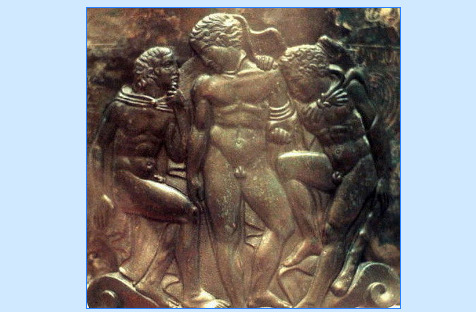
Iolaus (L) and Heracles (R) united by Eros
The Theban gymnasium was also named after him, and the Iolaeia, an athletic festival consisting of gymnastic and equestrian events, was held yearly in Thebes in his honor. The victors at the Iolaea were crowned with garlands of myrtle.
Iolaus provided essential help to Heracles in his battle against the Hydra, his second labor. Seeing that Heracles was being overwhelmed by the multi-headed monster (the Lernaean Hydra), who grew two heads in place of each one cut off, Iolaus sprang to help, cauterizing each neck as Heracles beheaded it.

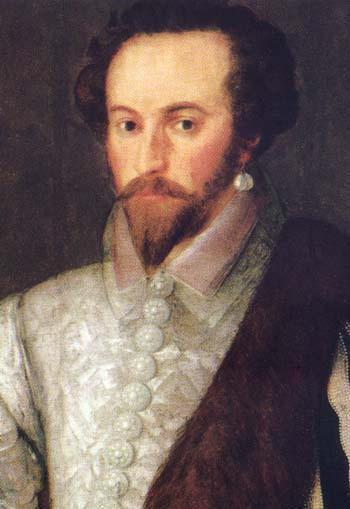
1618 – Sir Walter Raleigh was executed on this date (b.1552). The famed English writer, poet, courtier and explorer was responsible for establishing the second English colony in the New World (after Newfoundland was established by Sir Humphrey Gilbert nearly one year previously, August 5 1583), on June 4, 1584, at Roanoke Island in present-day North Carolina.
The question for us here is this: Was Sir Walter Raleigh Christopher Marlowe's lover? Anything is possible, especially when so little is known about both. For many years, this provocative possibility has been suggested, even though it is based entirely on speculation. Marlowe wrote a poem titled, "The Passionate Shepherd to His Love," which begins with the charming invitation "Come live with me and be my love." A twin poem, "The Nymph's Reply to The Shepherd," appeared shortly thereafter, and there is little doubt that it was written by Raleigh out of love for Marlowe.


1931 – Clyde Hicks of North Carolina (official fucker!) was stationed in Hawaii, arrested on sodomy charges and sentenced to six years in prison. He was transferred to Alcatraz where he was put into solitary confinement for passing a note to another man. He was released in 1935.


Wayne Winterrowd (L) & Joe Eck
1941 – Wayne Winterrowd, American gardening expert and designer who wrote extensively on the subject, was born (d.2010). The garden Winterrowd and his partner built covered 7 acres at their Vermont home and became a tourist attraction to visitors from around the world.
Winterrowd, who was born in Shreveport, Louisiana, started gardening when he was three years old and read widely on the subject while he was growing up. Visits to an aunt who lived near Lake Pontchartrain helped him learn about gardening and he developed an interest in tropical plants on family trips to Florida and Cuba.
While teaching Jacobean literature at Tufts University in 1969, he first met Joe Eck, and they lived together in Denmark where Winterrowd had earned a Fulbright scholarship.
Together with Eck, Winterrowd learned as much as they could about gardening and earned a living by teaching English, French and Latin at area elementary and high schools. They spent the 1960s and 1970s as part of the homegrown food movement.
Moving from a farmhouse in Pepperell, Massachusetts to Readsboro, Vermont, Winterrowd and Eck devoted themselves to creating the North Hill garden, in which they grew Himalayan blue poppies, Japanese dogwoods, locust trees, magnolia, and stewartias. They cleared the hilly wooded land they had acquired, planting a diverse variety of plants, including as many as 100,000 daffodil bulbs. The garden drew visitors from around the world to their home in Southern Vermont near the Massachusetts border.They also grew fresh vegetables and raised dairy cows, pigs and poultry. Roger Swain, host of the Public Broadcasting Service television series The Victory Garden said "Their garden is of such quality and diversity that it rivals any in Europe. But there is nothing derivative about North Hill; it is American gardening at its best", with Fergus Garrett crediting Winterrowd and Eck with being "one of the driving forces in North American horticulture."
Winterrowd and Eck traveled across the United States and Canada to design customized gardens for their customers.
Winterrowd and Eck were joined in a civil union in 2000 and were married in 2009 after Vermont legalized same-sex marriage. Winterrowd died at age 68 on September 17, 2010, at his home in Readsboro, Vermont due to heart failure. He was survived by Eck and by a son they adopted.

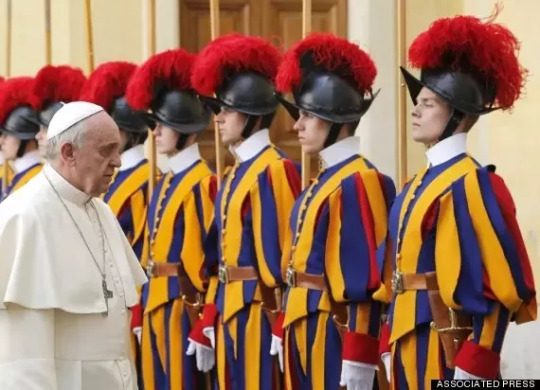
The Swiss Guards in traditional uniform.
1954 – Alois Estermann (d.1998) was a senior officer of the Swiss Guard who was murdered in his apartment in the Vatican City.
Estermann was born in Gunzwil, in the Canton of Lucerne. In 1998 he was appointed as Commander of the Pontifical Swiss Guard.
According to official Vatican statements, Estermann and his Venezuelan wife, Gladys Meza Romero, were killed in May 1998 by a young Swiss Guard Cédric Tornay, who later committed suicide. Estermann, formerly acting commander of the Swiss Guard, had been confirmed in his position the same day. Tornay had earlier been reprimanded for breaches of discipline and had been passed over for a medal routinely awarded to Guards after three years of service.
The British journalist, John Follain, undertook extensive interviews with key witnesses to the murders to inform his book, City of Secrets: The Truth behind the murders at the Vatican (2006). Follain dismisses speculation that Estermann, his wife, and Tornay were murdered by an external fourth party or that Estermann was a spy for the former East German government.
Follain's research indicated that Cédric Tornay did indeed kill his commander, and his commander's wife before turning the gun on himself. Tornay found the running of the Swiss Guard archaic, and resented the dominance of the Swiss German majority contingent. Tornay turned to Alois Estermann for affection, and enjoyed a short homosexual affair. Their relationship deteriorated into acrimony as Tornay realised that Estermann had betrayed him with another guard. Estermann's close links to the Opus Dei movement, and his final refusal to award the benemeriti medal for 3-years service led to further frustration and Tornay's ultimate decision to kill Estermann.
Pope John Paul II personally celebrated Estermann's Funeral Mass in the church of Saints Martin and Sebastian.


1985 – Gio Benitez is an American broadcast journalist and correspondent for ABC News, who appears on Good Morning America, World News Tonight, 20/20, and Nightline. He also hosts the Fusion version of Nightline. He has won two television news Emmy awards.
Benitez was born in Miami, Florida to Cuban parents. He is a 2004 graduate of Miami Coral Park High School. In 2008, Benitez graduated with a Bachelor of Arts in Anthropology and Sociology from Florida International University. He is fluent in both English and Spanish.
Benitez joined ABC News in 2013. He has covered a wide range of stories for the network, including the Boston Marathon bombing; The Alabama child held hostage underground in an eight-day standoff; the American mother stuck in a Mexican jail and nearly every major snow storm that swept the nation during the winter of 2013.
Before joining ABC News in 2013, he was a reporter for WFOR, the CBS owned-and-operated TV station in Miami, where he covered the 2012 Presidential election and reported extensively on the Trayvon Martin case.
Benitez married longtime partner Tommy DiDario in front of family, friends, and ABC News colleagues inside the historic Walton House in Miami, Florida in April 2016.

Gio Benitez with husband Tommy DiDario


1989 – Under the headline "Peek-a-Boo," New York's Outweek magazine publishes a list of 66 celebrities and public figures who are allegedly gay but closeted. The article marks the beginning of controversial "outing" by some gay activists.


1995 – On this date in Iran, a 31 year old man was convicted of "ugly and improper conduct" and sentenced to twenty lashes for cross-dressing.

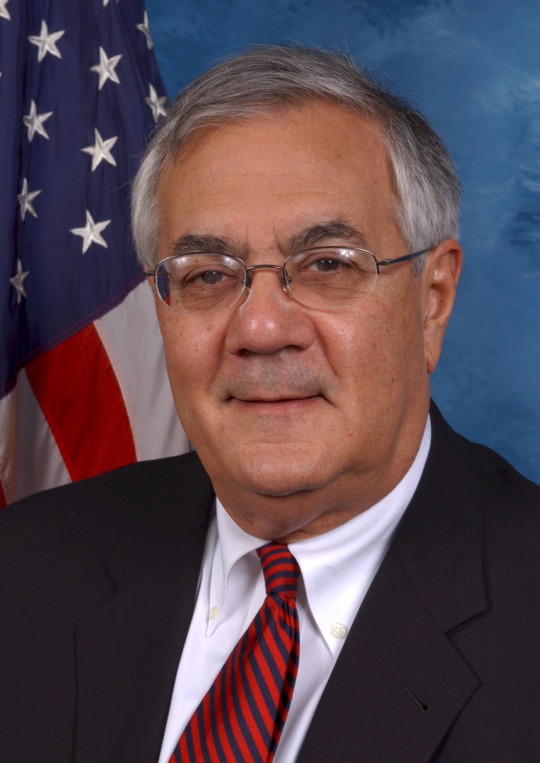
1997 – U.S. Congressman Barney Frank introduced a bill calling for the extension of health insurance coverage to the domestic partners of US federal employees through the federal employee health program.

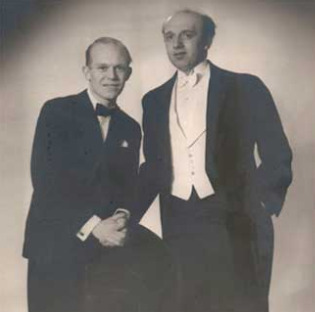
2011 – Died: Axel Axgil (b.1915), Danish gay activist. Axel and Eigil Axgil (b.1922 - d.1995) were a longtime couple. They were the first gay couple to enter into a registered partnership anywhere in the world following Denmark's legalisation of same-sex partnership registration in 1989, a landmark legislation which they were instrumental in bringing about. They adopted the shared surname, Axgil, a combination of their given names, as an expression of their commitment.
Axel, born Axel Lundahl-Madsen, and Eigil, born Eigil Eskildsen, inspired by the 1948 UN Declaration of Human Rights, together with several friends, founded F-48 or Forbundet af 1948 (The Association of 1948), Denmark's first gay rights organization. By 1951, F-48's membership had grown to 1,339 and there were branches in Sweden and Norway. In 1985, F-48 became the Danish National Association of Gays and Lesbians (Landsforeningen for Bøsser og Lesbiske, Forbundet af 1948 or LBL). The couple launched a magazine, Vennen (The Friend).
In 1989, Denmark became the first nation in the world to recognize domestic partnerships for same-sex couples. On October 1, 1989, the Axgils and 10 other Danish couples were married by Tom Ahlberg, the deputy mayor of Copenhagen, in the city hall, accompanied by worldwide media attention. The Axgils had been a couple for 40 years.
Eigil Axgil died on September 22, 1995 at the age of 73. Axel Axgil died on October 29, 2011 at the age of 96.


11 notes
·
View notes
Text
You know what show I really hope the ghosts put on while they were all together? HMS Pinafore. Everyone from Fanny onwards most likely knew it reasonably well already, either by cultural osmosis or from being a theatre gay, and for the rest it's probably the easiest operetta to pick up that's ever existed.
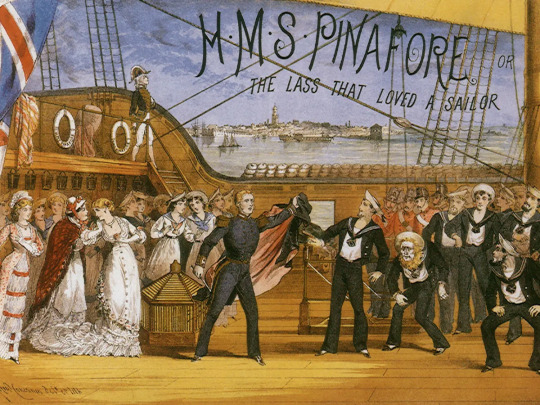
I imagine it would have gone down something like this:
Josephine Corcoran- Kitty
Ralph Rackstraw - Thomas
Absolute no-brainers for the lead soprano and tenor. Ralph scores extra points for being one of the most dramatic and flouncy tenors Gilbert ever wrote. At one point he has a speech that's so flowery it's genuinely incomprehensible. Unfortunately his big aria is terribly dull (still in-character tbh) but both of Josephine's are brilliant. Especially "The hours creep on apace", where, having secretly accepted Ralph's proposal, she does waver a bit since, after all, he is a bit of a pleb.
Captain Corcoran - The Captain
Keeps the Pinafore ship-shape and Bristol-fashion. Would have a lovely father-daughter relationship with Josephine. Gets to be in lots of bangin' numbers, especially "I am the Captain of the Pinafore".
Captain: I do my best to satisfy you all -
Crew: And with you we're quite content!
Captain: You're exceedingly polite and I think it's only right to return the compliment.
Sir Joseph Porter - Julian
Marvellously smug and superior patter baritone who got to his lofty position via flattery and luck rather than merit. No direction needed.
Little Buttercup - Fanny
I think she would struggle playing someone who's meant to be lowly, but on the other hand she'd probably really get into every other aspect of the character, especially when she gets to drop mysterious hints all the way through, and dramatically reveal the twist at the end. (She also really reminds me of the mature student who played Little Buttercup for my university's Light Opera Society once, who was very definitely another repressed middle-aged horndog. Get it, girl.)
Cousin Hebe - Mary
Not much of a part, but I suspect getting Mary to concentrate on something like this for any length of time without going off on a tangent would be... tricky. Would be enthusiastic about helping Josephine and might have to be held back from headbutting Captain Corcoran when he tries to stop the elopement.
Dick Deadeye - Robin
Hunched, triangular bass Dick Deadeye growls his way through the opera causing chaos just... 'cos. Is far more perceptive than the Captain and has to really spell out that Josephine and Ralph are planning on running away together.
Bosun's Mate - Humphrey's head
Carpenter's mate and director - Pat
This probably required slightly delicate handling, since Pat is the better singer (and He is an Englishman is harder than it looks), but a) keeping rehearsals from descending into anarchy probably took all his energy and b) Humphrey might have been slightly grumpy being relegated to a really tiny role again. At least they both get to be in A British Tar is a Soaring Soul.
Chorus of sisters, cousins, and aunts - Humphrey's body
Carries the whole show on his back.

#bbc ghosts#gilbert and sullivan#G&S#posts I made instead of doing actual work#and which will be of interest to absolutely no-one but me lol#I bet Cap played Cousin Hebe at school and got a huge thrill from it#sometimes to make the role bigger they'll put in When Maiden Loves from The Yeomen of the Guard for her#and that is a very lovely yearning song that probably really appealed to him for no reason in particular; definitely not#I imagine Lady B suddenly getting into it would be quite alarming for the Captain but that sounds hilarious so#also I imagine that everyone does all the chorus numbers#trying hard not to imagine what Julian does during We Sail the Ocean Blue on the line 'as the balls whistle free o'er the bright blue sea'
33 notes
·
View notes
Text
It's not even 9 and I had to be reminded of the existence of Sir Humphrey Gilbert again. Glad to know that he died before he could wreak substantial havoc on newfoundland himself, but I will have zero surprise if that Monster that literally bled Ireland also treated the native denizens of America absolutely cruelly and despicable.
2 notes
·
View notes
Text
Honestly, the most intriguing parts of the Roanoke Colony incident happened before and after the colonists 'disappeared'. I'm about to give way too much information, but this incident has always fascinated me!
If you'll indulge me, here some important background information:
In 1578, Queen Elizabeth I gave Sir Humphrey Gilbert the right to colonize North America. The charter was commonly believed to mean that he could claim any land north of Spanish-claimed Florida. When Sir Humphrey died, that charter was given to his brother, Adrian Gilbert, and his half-brother, Sir Walter Raleigh. The catch was that Humphrey died in 1583 and his brothers only had until 1591 to establish a colony if they wanted the land granted by the charter.
Okay, now to the actual history of Roanoke:
In 1584, Raleigh sent an expedition to explore and find a promising area for a colony. The expedition, made up of 100 men, was led by Ralph Lane and landed on Roanoke Island. (Keep in mind, this is Roanoke, Maryland in the Outer Banks, not Roanoke, Viriginia.) Lane quickly made enemies of every surrounding Native American tribe, so the expedition had to leave because they ran out of food.
Also present on the 1585 expedition was mapmaker John White. White was promised 500 acres of land if he made maps of the area.
Since Lane was such an idiot the first time around, Raleigh put John White in charge of the 1587 expedition and made him governor. Now, John White wasn't stupid and he knew that the Native American tribes nearby would hate any settlers. Roanoke was never the intended destination for the second colony - Chesapeake was.
The interesting thing was that, when the ship stopped in Puerto Rico for supplies, one of the sailors told the Spanish that they were going to Roanoke. There's a theory that Sir Walter Raleigh's rivals sabotaged the Roanoke colony.
The theory goes on to suggest that Fernandes, the captain of the flagship Lion, was bribed. Fernandes was an experienced sailor who was familiar with the area, but took a great deal of time to make basic preparations and took unnecessary detours. The colonists arrived on Roanoke Island on July 22nd, way too late to plant crops like they had intended. (There's also some evidence that there was a severe drought in the area.) Since they were short on supplies and none of the local tribes were friendly enough to trade with, the colonists sent John White back to England to bring back more food and supplies.
John White did leave for supplies on August 27th, as mentioned above, and his return was delayed by the Anglo-Spanish War. He left in 1587 and got back in 1590. But he didn't find bodies, bones, signs of destruction, or even the settlement he had left. The buildings had been taken down, disassembled rather than destroyed. Even the trunks of personal belongings White buried before he left had been dug up and looted.
As everyone knows, the word Croatoan was carved into a tree and Cro was carved into one of the supports on the fort. That's significant for two reasons: First, nearby Croatoan Island was where the Powhatan tribe lived. The Powhatans had been friendly and willing to trade with the settlement after White had done some work repairing relations.
The second reason it's significant is because the 1587 expedition had a code planned out. If the colony came under distress, someone was to carve a Maltese cross into something in the area. If they hadn't carved anything at all, White may have assumed that they were surprised and didn't have time to carve anything before they were taken. But something had been carved and there were no Maltese crosses in the area, so White was understandably confused.
The sailors in the 1590 relief mission pressed White to leave since one of the cables on the ship had snapped and it was down to one anchor - greatly increasing the risk of a shipwreck. With that in mind and a storm blowing in, the group elected to leave, spend the winter repairing the ship in the Caribbean, and return in the spring of 1591. White agreed to this, potentially because they had seen smoke on the island and found fresh tracks, but had never been approached. The assumption was that the colonists would have made contact if they had been free to. Without time to launch a rescue, the group had little choice but to leave.
Unfortunately, the ship was blown off-course and ended up returning to England in late October.
Now, the history around Roanoke is muddy. That's on purpose. Sir Walter Raleigh publicly stated his belief that the colonists were alive, but mostly because his claim to the charter was upheld until someone could prove that the colony members had died. He also claimed to stage at least one search in Maryland for information, but it was a cover story while he searched for El Dorado, then again when he wanted to covertly harvest sassafras. Any further attempts were halted when he was arrested for treason against King James.
We're not even 100% sure where the 1587 colony was. Due to poor record-keeping and changing geography, the original location was unknown even by the early 1600s. (Ironically, we do know where the 1585 colony was.) And yes, while there were plenty of reports of Native Americans with light eyes and hair, no definitive proof of the colonists was ever found. This was especially hard on White, whose family - including his young granddaughter - were among the colony members.
There have been attempts to trace DNA of the lost colonists to see if they really did integrate with nearby tribes. As of this time, the program has not identified any living descendants of the lost colonists, mostly due to a lack of original DNA to use as a point of comparison.
And don't even get me started on the Dare Stones.
(If you're interested in learning more about the Roanoke Colony, I highly suggest the podcast episode 'What happened to the lost colony at Roanoke?' from Stuff You Should Know.)
not to be a history fucker on main but the whole mystery of the lost colony of roanoke is so fucking funny
458K notes
·
View notes
Text
Events 8.5 (before 1860)
AD 25 – Guangwu claims the throne as Emperor of China, restoring the Han dynasty after the collapse of the short-lived Xin dynasty. 70 – Fires resulting from the destruction of the Second Temple in Jerusalem are extinguished. 642 – Battle of Maserfield: Penda of Mercia defeats and kills Oswald of Northumbria. 910 – The last major Danish army to raid England for nearly a century is defeated at the Battle of Tettenhall by the allied forces of Mercia and Wessex, led by King Edward the Elder and Æthelred, Lord of the Mercians. 939 – The Battle of Alhandic is fought between Ramiro II of León and Abd-ar-Rahman III at Zamora in the context of the Spanish Reconquista. The battle resulted in a victory for the Emirate of Córdoba. 1068 – Byzantine–Norman wars: Italo-Normans begin a nearly-three-year siege of Bari. 1100 – Henry I is crowned King of England in Westminster Abbey. 1278 – Spanish Reconquista: the forces of the Kingdom of Castile initiate the ultimately futile Siege of Algeciras against the Emirate of Granada. 1305 – First Scottish War of Independence: Sir John Stewart of Menteith, the pro-English Sheriff of Dumbarton, successfully manages to capture Sir William Wallace of Scotland, leading to Wallace's subsequent execution by hanging, evisceration, drawing and quartering, and beheading 18 days later. 1388 – The Battle of Otterburn, a border skirmish between the Scottish and the English in Northern England, is fought near Otterburn. 1460 – The Kingdom of Scotland captures Roxburgh, one of the last English strongholds in Scotland, following a siege. 1506 – The Grand Duchy of Lithuania defeats the Crimean Khanate in the Battle of Kletsk. 1583 – Sir Humphrey Gilbert establishes the first English colony in North America, at what is now St. John's, Newfoundland and Labrador. 1600 – The Gowrie Conspiracy against King James VI of Scotland (later to become King James I of England) takes place. 1620 – The Mayflower departs from Southampton, England, carrying would-be settlers, on its first attempt to reach North America; it is forced to dock in Dartmouth when its companion ship, the Speedwell, springs a leak. 1689 – Beaver Wars: Fifteen hundred Iroquois attack Lachine in New France. 1716 – Austro-Turkish War (1716–1718): One-fifth of a Turkish army and the Grand Vizier are killed in the Battle of Petrovaradin. 1735 – Freedom of the press: New York Weekly Journal writer John Peter Zenger is acquitted of seditious libel against the royal governor of New York, on the basis that what he had published was true. 1772 – First Partition of Poland: The representatives of Austria, Prussia, and Russia sign three bilateral conventions condemning the ‘anarchy’ of the Polish-Lithuanian Commonwealth and imputing to the three powers ‘ancient and legitimate rights’ to the territories of the Commonwealth. The conventions allow each of the three great powers to annex a part of the Commonwealth, which they proceed to do over the course of the following two months. 1763 – Pontiac's War: Battle of Bushy Run: British forces led by Henry Bouquet defeat Chief Pontiac's Indians at Bushy Run. 1781 – The Battle of Dogger Bank takes place. 1796 – The Battle of Castiglione in Napoleon's first Italian campaigns of the French Revolutionary Wars. 1816 – The British Admiralty dismisses Francis Ronalds's new invention of the first working electric telegraph as "wholly unnecessary", preferring to continue using the semaphore. 1824 – Greek War of Independence: Konstantinos Kanaris leads a Greek fleet to victory against Ottoman and Egyptian naval forces in the Battle of Samos. 1858 – Cyrus West Field and others complete the first transatlantic telegraph cable after several unsuccessful attempts. It will operate for less than a month.
0 notes
Text
i know hes probably an awful guy but british explorer sir humphrey gilbert did not have to devour as much as he did when he said 'we are as near heaven by sea as by land'... especially as his final words
0 notes
Text
History
August 5, 1583 - The first British colony in North America was founded by Sir Humphrey Gilbert, a British navigator and explorer. He sighted the Newfoundland coast and took possession of the area around St. John's harbor in the name of the Queen. He was later lost at sea in a storm off the Azores on his return trip to England.
August 5, 1861 - President Abraham Lincoln signed into law the first Federal income tax, a 3 percent tax on incomes over $800, as an emergency wartime measure during the Civil War. However, the tax was never actually put into effect.
August 5, 1962 - Film star Marilyn Monroe died at age 36 from an overdose of sleeping pills. She made 29 films during her career and came to symbolize Hollywood glamour.
August 5, 2011 - Standard & Poor’s credit rating agency downgraded the United States debt from its highest rating of AAA to a lesser AA+ rating, marking the first-ever decline of credit worthiness for the U.S. The agency cited America’s $14 trillion in outstanding debt and ineffective political leadership regarding debt reduction.
Birthday - John Eliot (1604-1690) was born in Hertfordshire, England. Known as the "Apostle to the Indians," his translation of the Bible into an Indian tongue was the first Bible to be printed in America.
0 notes
Text
Blorbo List
I got bored so I decided to make a list of all my blorbos. feel free to ignore :P
Note: "blorbo," in my book, is any character I would die for, not necessarily my top favorite character in the fandom. I would die for all of these, but my favorites are marked with the sparkle emoji. my all time favorite character is noted with a mushroom
(fandoms are not in order)
Fantasy
The Lord of the Rings– Merry Brandybuck🍄, Pippin Took, Frodo Baggins, Boromir, Legolas, Gimli, Aragorn, Eowyn, Faramir
The Chronicles of Narnia– Edmund✨, Lucy, Reepicheep, Eustace, Caspian, Peter, Susan
The Silmarillion– Turin Turambar✨, Finduilas, Beleg Cuthalion, Finrod Felagund, Beren, Luthien
Pirates of the Caribbean– Jack Sparrow✨, Will Turner, Hector Barbossa, Calypso, Syrena, Philip Swift
Peter Pan 2003 – Peter Pan✨, Wendy Darling, John Darling, Slightly
Crime/Detective
Endeavour– Endeavour Morse✨, Joan Thursday, Shirley Trewlove, George Fancy, Reginald Bright, Fred Thursday
Death in Paradise– Humphrey Goodman✨, Camille Bordey, Florence Cassell, Catherine Bordey, JP Hooper, Ruby Patterson
Shakespeare and Hathaway– Luella Shakespeare, Frank Hathaway, Sebastian Brudenell✨
The X Files– Fox Mulder✨, Dana Scully
Period/Historical Dramas
Pride and Prejudice– Elizabeth Bennet✨, Fitzwilliam Darcy, Jane Bennet, Mr Bingley, Georgiana Darcy, Maria Lucas
1917– William Schofield✨, Thomas Blake, Lauri, the convoy gang
Newsies– Jack Kelly✨, Crutchy, Spot, Sarah, pretty much all the Newsies
Our Mutual Friend– Lizzie Hexam✨, Eugene Wrayburn, John Harmon, Bella Wilfer
The Scarlet Pimpernel– Sir Percy Blakeney✨
A Tale of Two Cities– Sydney Carton✨
Wives and Daughters– Molly Gibson✨, Roger Hamley
The Book Thief– Liesel Meminger, Rudy Steiner✨, Hans Hubermann
Les Miserables– Enjolras, Courfeyrac✨, Combeferre, Jehan, Joly, Grantaire, Feuilly, Bahorel, Bossuet, Eponine, Gavroche
Anne of Green Gables– Anne Shirley, Gilbert Blythe✨, Diana Barry
The Man From Snowy River– Jim Craig✨, Jessica Harrison
Action
Tintin– Tintin✨, Captain Haddock, Professor Calculus, Snowy
Marvel Cinematic Universe– Peter Parker✨, Loki Laufeyson, Steve Rogers, MJ Watson, Ned Leeds, Wanda Maximoff, Peggy Carter, Natasha Romanoff, Yelena Belova, Sylvie
The A Team– HM Murdock✨, Faceman Peck, Amy Amanda Adams
Macgyver– Macgyver✨, Pete Thornton
Six of Crows– Kaz Brekker, Inej Ghafa✨, Matthias Helvar, Nina Zenik
Animated
Miraculous Ladybug– Marinette Dupain-Cheng/Ladybug, Adrien Agreste/Chat Noir✨, Alya Cesaire, Nino Lahiffe, Jessica Keynes
Centaurworld– Horse, Wammawink, Rider, Durpleton✨, Glendale, Stabby, Nowhere King/Elktaur, Mysterious Woman, Waterbaby
How to Train Your Dragon– Hiccup Haddock✨, Astrid Hofferson, Snotlout Jorgenson, Fishlegs Ingerman, Ruff and Tuff Thorston, Toothless, Stormfly
Tangled– Rapunzel✨, Eugene Fitzherbert
Spirit: Stallion of the Cimarron– Spirit✨, Rain, Little Creek
Skyward Sword– Link✨, Zelda, Skipper, Gorko, Pipit, Karane, Ghirahim, Fi
Twilight Princess– Link✨, Zelda, Midna, Shad, Ashei
anyway there you go :P
8 notes
·
View notes
Photo





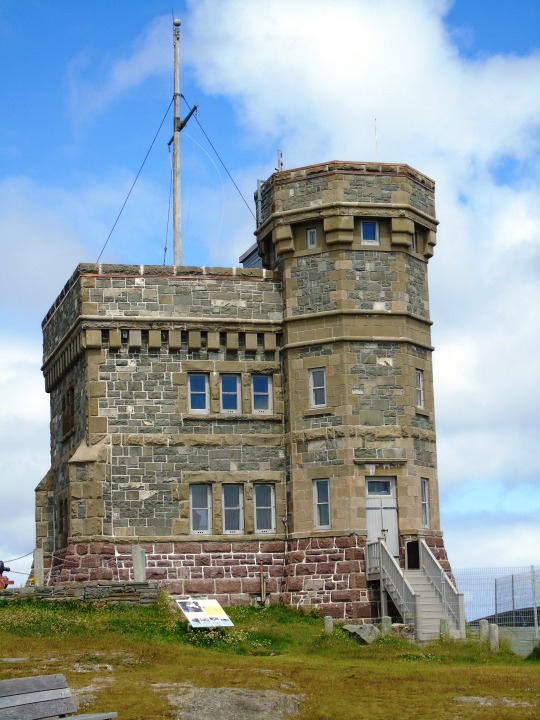




Sir Humphrey Gilbert established the first English colony in North America, at what is now St. John’s on August 5, 1583.
#Narrows of St. John's Harbour#Cabot Tower#Signal Hill#travel#vacation#summer 2015#original photography#cityscape#architecture#landmark#St. John's#Newfoundland and Labrador#Sir Humphrey Gilbert#first English colony#5 August 1583#440th anniversary#Canadian history#white colonialism#boat#ship#tourist attraction#Newfoundland
4 notes
·
View notes
Text
BLOGTOBER 10/1/2021: DRACULA'S DAUGHTER (1936)
Once in a while I pick out a movie about which so much has been said that I feel a little embarrassed pretending I have anything to contribute. DRACULA'S DAUGHTER, Lambert Hillyer's sequel to the 1931 Universal classic, has become essentially synonymous with the concept of the queer-coded villain, and so, many more relevant voices than mine have offered their interpretations of the movie by now. That's your cue to seek out and read any of the many focused LGBT+ considerations of this movie, if that's your bag! Meanwhile...me.
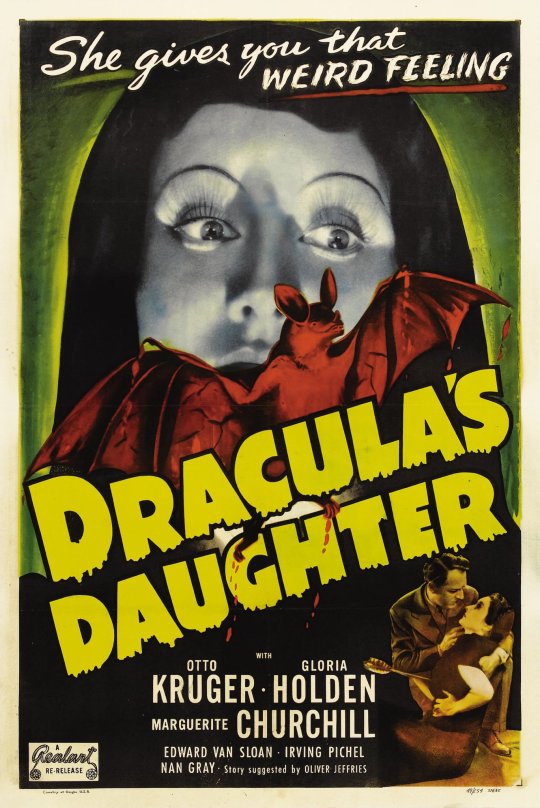
One of the great taglines of all time.
DRACULA'S DAUGHTER picks up directly from the final moments of Tod Browning's DRACULA, with Professor Von Helsing (sic! I assume this had to do with a copyright snafu) coolly explaining to a pair of bumbling bobbies why they've discovered him in the bowels of Carfax Abbey with a freshly staked Count Dracula. As he begins the ordeal of explaining the secrets of the undead to Scotland Yard, the mysterious Countess Marya Zaleska (the glorious Gloria Holden) absconds with the Count's body. A twilight exorcism-by-fire is meant to free her tormented soul from what she calls "the curse of the Draculas", but as her manservant Sandor (Irving Pichel) grimly affirms, it's all for naught. She will have to go on stalking the night...unless she can find a good conversion therapist.
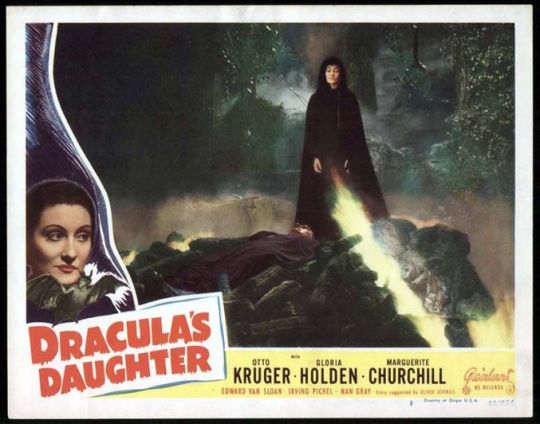
Gloria Holden is unforgettable as the unblinking, self-loathing femme fatale fated to carry on her father's feeding habits. Equal parts Glenn Close and Morticia Addams, she lights up the night with her glittering gaze and hypno-ring, which she uses to seduce and destroy unfortunate souls like Lili (Nan Grey). When Lili agrees to strip for an artist's study of her creamy bust, the Countess drains her of more than her dignity, an indulgence that will be Zaleska's undoing; she turns to smug psychiatrist Dr. Jeffrey Garth (Otto Kruger) for his reputed ability to "release the human mind from any obsession", not realizing that he is already aiding Von Helsing's (Edward Van Sloane) case with Scotland Yard. When Garth is called upon to examine Lili, already having vamps on the brain, he puts two and two together about the guilt-stricken Countess.
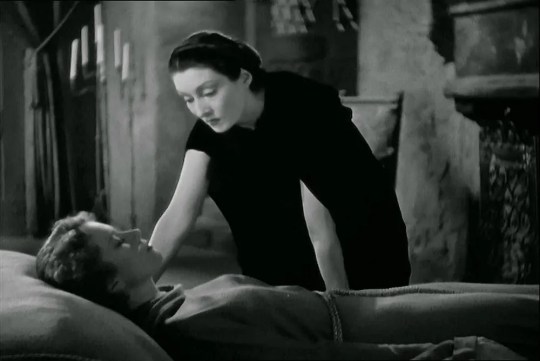
Much has been said about Marya Zaleska's apparent craving for female flesh, which is so explicit that it nearly escapes the realm of vampiric metaphor. Her agonized inability to embrace her own outsider nature completes the picture of her queerness, which critic Mark Clark suggests is augmented by Gloria Holden's own ambivalence toward her first starring role. In his book Smirk, Sneer and Scream: Great Acting in Horror Cinema, he remarks, "Her disdain for the part translates into a kind of self-loathing that perfectly suits her troubled character."
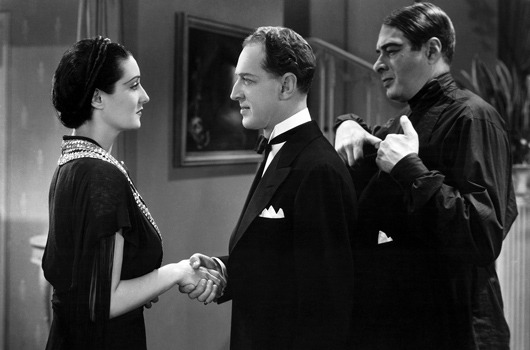
But, for my money, just as much of the subtextual heavy lifting is done by the men in DRACULA'S DAUGHTER. By and large, they are either comically impotent, or virulently misogynist, or both, reminding us that the Countess's female troubles are compounded by her disastrously male-dominated environment. Constable Albert (Billy Bevan) sighs and swoons his way through the discovery of Dracula's corpse, and when Dr. Garth most desperately needs help from Scotland Yard, Sir Basil Humphrey (Gilbert Emery) is cocooned in satin sheets sorting out his stamp collection while his long-suffering butler tries to make him take his barley water treatment. Garth himself is a dyed-in-the-wool woman-hater, who we first find on a hunting trip fantasizing about murdering his female patients: "There are a few birds in London I'd like to shoot, and they haven't feathers either!" His ostensibly romantic relationship with his baroness-secretary Janet Blake (Marguerite Churchill) is more hate-hate than love-hate, and her inevitable rescue from the vampire's clutches is more much dryer and chaster than what a distressed damsel can usually expect. Where Bram Stoker's Mina was torn between her earthly love for her fiancé and the supernatural seduction of the vampire, Garth's conflict is between a patient he sees as a prize guinea pig, and a secretary he'd rather shoot to death...but he needs her to tie his necktie for him, something he is not competent to do alone.
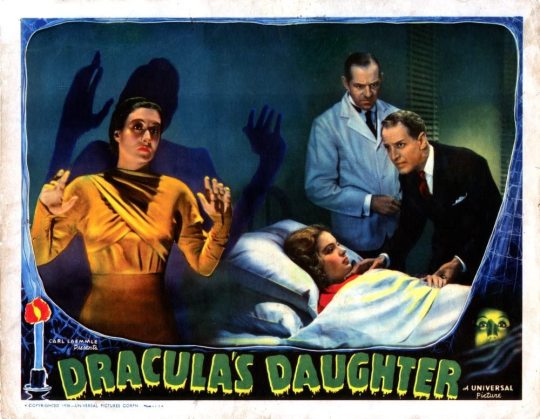
DRACULA'S DAUGHTER may not compete with the Lugosi classic, but it has separate virtues that make it worthy on its own terms. Vampire narratives are so often driven by romantic longing, but there is little of that to be found here. Our antiheroine is alienated by her own carnal desires, for which she seeks a shrink rather than a mate, and nothing is to be solved by the power of love, so the creature's eternal loneliness has a different character than what we're used to seeing in these gothic fairytales. That makes of this sequel a much colder dish than expected, and personally, I savor its unique flavor.
If you have not yet done so, you can enjoy this misanthropic monsterpiece right here--and I heartily recommend it:
https://archive.org/details/DraculasDaughter1936
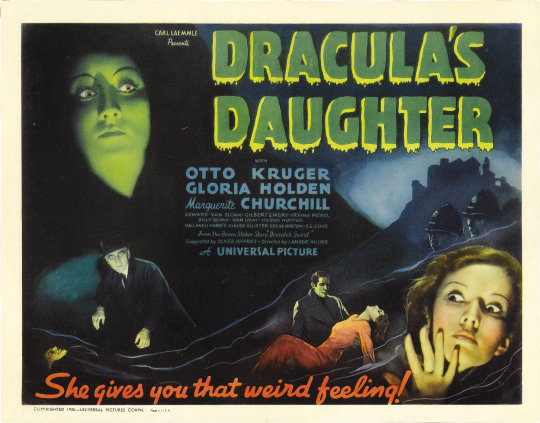
#she gives you that weird feeling!#dracula's daughter#1936#monsters#vampire#gloria holden#otto kruger#marguerite churchill#irving pichel#edward van sloan#dracula#horror#blogtober#garrett fort#universal#queer cinema#marya zaleska
53 notes
·
View notes
Text
Journey to Bosworth, conclusion. Why did Richard III lose?
Before starting, I have to say that this is my personal opinion. For me, this is why the last Plantagenet king falled. As you will see, I do not consider that it was the most probable outcome, far from it.
At Bosworth, Richard III lost while he had more men, more support and was an experienced commander with experienced lieutenants
Many argued that he lost because he was sold out by the magnates. After all, Northumberland and Lord Stanley didn't move to help him, and Sir William Stanley 'betrayed' him.
This explanation is helpful but reductive and simplistic. Betrayal was very common in the War of the Roses. Richard III had witnessed it all his life. In 1459, while Richard was seven years old, his father fled to Ireland because one of his lieutenants had defected to Henry VI. He saw his father's castle in Ludlow be stormed out by Lancastrians. Richard III also saw his closest ally, the duke of Buckingham, turn on him for little reason in 1483. He was used to it. Stanley and Northumberland's defection was utterly predictable Richard III knew that Northumberland intentionally brought as little troops as he could and Richard put so little faith toward lord Stanley that he took hostage his heir (a maneuver which did work at buying his neutrality).
As for Sir William Stanley's decisive defection, it wasn't even a surprise. Richard III branded him a traitor a few weeks before. He acted accordingly. Nor did Richard III lacked information about his enemies. Henry Tudor was openly his rival since the beginning of his reign. His chief commander, John de Vere, was known from Richard. He fought against him at Barnet, stole his lands, and tried to have him executed in 1484. He also knew that the french disliked him as well as he disliked them. Their investment in the Tudor cause is hardly surprising.
To sum it up: there was little asymmetry of information between Richard III and his rivals. Richard knew his friends, knew who wasn't reliable, and knew his enemies. True, he didn't know some key information such as where would Henry Tudor would land, just as some minor defections came out as a bitter surprise. Seeing Rhys ap Thomas defect to the Tudors after he pensioned him 10 marks a year was an unwelcome surprise, but hardly a fatal one.
Few contemporaries thought that Henry Tudor would actually win (partly because they didn't know the intentions of some key magnates). There are many examples of that. In 1484, Queen Elizabeth Woodville accepted to quit her sanctuary and made peace with her (alleged) brother-in-law in exchange for a correct treatment of her daughters. She did hand some of her daughters to him. Her brother Richard Woodville did make his peace with Richard III, and her son the Marquess of Dorset also attempted to run from France to make his personal peace before being stopped by the Tudors. Pierre Landais tried to sold-out Henry Tudor to Richard III in 1484, showing how little faith he had in a Tudor victory. After Henry landed and marched from Wales toward England, the city of Swhresbury obstinately refused to let him pass, fearing Richard's wrath (and possible lawlessness). Only Sir William Stanley's intervention would convince them.
In no way Henry Tudor had massive support. From his landing to the battle of Bosworth, defections to his side were few. Rhys ap Thomas, Sir John Savage, Sir Gilbert Talbot, and lesser noteworthy welsh were all local figures. Compared to the 1483 rebellion (ill-named Buckingham's rebellion) in which three different areas revolted with some major rebellious figures such as the duke of Buckingham, Sir Thomas Saint-Leger, and the Wydevilles, the defections during the invasion look marginal. Especially when one considers that Henry Tudor landed in Wales because he thought he had support there, and conversely Richard III had little.
Henry Tudor had little chance of winning. He tried because no compromise was possible with Richard III, who showed often his ruthlessness. Most of the surviving rebels in 1483 had joined Henry in exile and pressed him to act. Their lands were already forfeited and distributed to Richard's supporters, and only Richard's death could vindicate and restore their wealth completely. As Henry Tudor knew in the Britton court, foreign support to English pretenders was erratic and highly conjunctural at best. The Brittons supported him in 1483, and a court faction attempted to sell him out the very next year. So, when France proposed limited financial and military support during the summer of 1485, he couldn't hesitate. It was his best shot.
Richard III on the reverse had real reasons to quiet himself and be confident in his victory. Why he most certainly wasn't might be due to private reasons. His wife and son died during his brief reign. This might have awakened a sense of insecurity. At its core, Richard might have felt insecure about his legitimacy. He had parliamentary approval of his regal title with Titus Regulus, he had been sacred and anointed but was he legitimate? The allegation of bastardy toward his nephews was based on oral claims, which was weak evidence at best.
The best proof of his legitimacy, and that God approved his reign was a battle. A winning battle would re-assert his reputation as a martial ruler, and more importantly, showed that God favored his claim in an ordeal by combat. In a martial, zealously religious society, a battle would be the final seal of his legitimacy, just as his brother, who reasserted his claim during numerous victorious battles. This was a fitting narrative for him. He was one of the best English military commanders alive, with an undeniably good military record. He could surely win against a nobody with no military experience. His spiteful royal denunciation of Henry Tudor in 1484 might be evidence that Richard III viewed the Tudor challenge as highly personal. Henry itself was the threat, more than those that supported him or were propping him up. During Buckingham's rebellion, Richard III didn't fight despite rushing to the south where the rebels were. The Howards and Sir Humphrey Stafford put down the rebellion without him. And Henry Tudor could flee. So Richard III had a practical and a theological/theoretical reason to force combat between his and the Tudor. Reasserting and confirming his legitimacy was one, and making sure that Henry Tudor would cause no more trouble was the other.
A decay in mental health is also possible from Richard III. He was a man who was highly confident in his skills and his worth. However, the atmosphere of betrayal and the loss of his family in the last few years did pull a tool on him. His legendary 'bad dream' on the eve of Bosworth was the most remarkable example of that. So when the rebel army did come in England, Richard III rushed toward them. He had reinforcement still coming on the day of the battle. York men were on their way and more forces certainly were coming from elsewhere. Time was on his side. He rushed toward the enemy perhaps because, in a spike of paranoia, he didn't want more defections and more betrayal, or because he wanted to put an end to it. What if the rebels fled at the sight of his numerically larger army, like his father at Ludlow? He didn't want that, he didn't want to endure a decade-long pretender like Edward IV would endure with Henry VI or Henry Tudor with 'Richard' (Perkin Warbeck)
When Northumberland refused to support Howard against Oxford, it didn't matter for Richard III. He knew Northumberland's opportunism. Catesby proposed to retreat like his father at Ludlow, like his brother when key magnates turned on him in 1470. He refused. Richard III simply couldn't admit his defeat on the battlefield, even as a temporary setback. His desire for legitimacy, his pride forbid it. He told so to Diego de Valera, the Spanish Ambassador, who reported it to his masters about the battle: "Now when Salazar, your little vassal, who was there in King Richard's service, saw the treason of the king's people, he went up to him and said: 'Sire, take steps to put your person in safety without expecting to have the victory in today's battle, owing to the manifest treason in your following.' But the King replied: 'Salazar, God forbid I yield one step. This day I will die as King or win'. "
At the battle, he wanted personal physical contact. He wanted to perform the deed of a knight, personally slain the Tudor dragon. He was a proud man of action, and couldn't let Howard once again defeat the core of the rebels while he was on the fence. Hence his fateful charge. This decision, more than any other, was fatal.
Richard III wanted Bosworth, Richard III made Bosworth. He accepted every odds. He accepted the disloyalty of Northumberland instead of assuming its consequences and retreat to reorganize. He ignored Sir William Stanley on his rear when he charged because he wanted to stick to his narrative. He was supremely confident in his skills and his capacity to slain Henry Tudor before Stanley could destroy him. And he was too insecure and proud to run. Run would be admitting his illegitimacy.
In other words, Richard III never admitted retreat as an option. Richard III also desperately wanted personal challenges. It is no coincidence that the last Plantagenet was both the last English king to die in battle and the only one to do so since the dawn of the Norman era.
When Richard III, in his last instants, shout 'treason' it was partly because Sir William Stanley's betrayal was relatively fresh in his mind, and to him, it was an English subject killing their king. It might have also been a way to cope. He was losing, he couldn't perform his martial ability in a winning way. Putting his failure on betrayal and a rigged battle was simply a way to cope
In conclusion, Richard III consciously and unconsciously shut down options that didn't fit his preferred narrative. This dysfunctional decision-making was partly created from his personal identity and value, and partly due to his society's views. This makes us understand why he chooses options that didn't favor his self-preservation and why he didn't retreat or acted differently. And it destroyed him.
#richard iii#henry vii of england#battle of bosworth#why henry vii won#And learned a lesson#we have no evidence of Henry VII putting himself in danger more than necessary during the many challenges of his reign
13 notes
·
View notes
Text
The Ghosts as Gilbert & Sullivan songs
Sometimes a girl likes to be self-indulgent. Strap in.
Thomas:
"In a doleful train, two by two we walk all day,
For we love in vain, none so sorrowful as they
Who can only sigh and say:
"Woe is me, alack a day..."" (Patience)
There is literally no upper limit to how dramatically people weep and sigh during this song. Also I imagine Thomas would love Patience and identify himself, very wrongly, with Grosvenor.
Kitty: 'Oh Happy Young Heart', The Sorcerer. Less because of the content and more for being the most upbeat and sweetly naive of all the G&S soprano arias, and in an operetta Kitty would 100% be a soprano
Captain: 'I am the Captain of the Pinafore', HMS Pinafore. I really, really enjoy the image of him singing "I do my best to satisfy you all" and the sailors chorusing "And with you we're quite content", but as @rhymneybelle pointed out to me he also suits this piece from The Sorcerer:
"The air is charged with amatory numbers,
Soft madrigals and dreamy lovers' lays,
Peace, peace old heart, why waken from its slumbers,
The aching memory of the old, old days?"
Lady Button: this bop from The Mikado:
"There is beauty in extreme old age —
Do you fancy you are elderly enough?
Information I'm requesting
On a subject interesting:
Is a maiden all the better when she's tough?"
"Throughout this wide dominion
It's the general opinion
That she'll last a good deal longer when she's tough!"
I also see a lot of Lady Sangazure from The Sorcerer in Fanny, being another posh repressed horndog.
Julian: 'When Britain Really Ruled the Waves', Iolanthe, or this bit from the Act 1 Finale:
"I heard the minx remark,
She'd meet him after dark,
Inside St. James's Park,
And give him one!"
Mary: "Sir Rupert Murgatroyd, his leisure and his riches
He ruthlessly employed in persecuting witches." (Ruddigore)
Pat: 'Oh a Private Buffoon is a Lighthearted Loon', The Yeomen of the Guard:
"Though your wife ran away with a soldier that day,
And took with her your trifle of money;
Bless your heart, they don't mind —
They're exceedingly kind —
They don't blame you — as long as you're funny!"
Robin: "WITH CAT-LIKE TREAD, UPON OUR PREY WE STEAL
IN SILENCE DREAD, OUR CAUTIOUS WAY WE FEEL,
NO SOUND AT ALL!! WE BARELY SPEAK A WORD!!!
A FLY'S FOOTFALL WOULD BE DISTINCTLY HEARD!" (The Pirates of Penzance. Watch the video, seriously)
Humphrey: 'Alone and Yet Alive', The Mikado :( Or possibly 'Is Life a Boon?' from The Yeomen of the Guard since he's pretty chill
Plague ghosts: 'Happy are we in our Loving Frivolity', The Sorcerer. It's a goddamn creepy song in context but they're having fun
And of course, when all the ghosts are trying their hand at haunting, they're 'When the Night Wind Howls', Ruddigore:
"When the footpads quail at the night-bird's wail, and black dogs bay at the moon,
Then is the spectres' holiday – then is the ghosts' high-noon!"
#if you've stuck it out far enough to read the tags you deserve a medal#bbc ghosts#gilbert and sullivan#G&S#Gilbert & Sullivan#operetta#the mikado#the sorcerer#ruddigore#pirates of penzance#hms pinafore#yeomen of the guard#patience#cap 100% did all-boys amateur G&S at some point
13 notes
·
View notes
Text
Events 8.5 (before 1900)
AD 25 – Guangwu claims the throne as Emperor of China, restoring the Han dynasty after the collapse of the short-lived Xin dynasty. 70 – Fires resulting from the destruction of the Second Temple in Jerusalem are extinguished. 642 – Battle of Maserfield: Penda of Mercia defeats and kills Oswald of Northumbria. 1068 – Byzantine–Norman wars: Italo-Normans begin a nearly-three-year siege of Bari. 1100 – Henry I is crowned King of England in Westminster Abbey. 1278 – Spanish Reconquista: the forces of the Kingdom of Castile initiate the ultimately futile Siege of Algeciras against the Emirate of Granada. 1305 – First Scottish War of Independence: Sir John Stewart of Menteith, the pro-English Sheriff of Dumbarton, successfully manages to capture Sir William Wallace of Scotland, leading to Wallace's subsequent execution by hanging, evisceration, drawing and quartering, and beheading 18 days later. 1388 – The Battle of Otterburn, a border skirmish between the Scottish and the English in Northern England, is fought near Otterburn. 1506 – The Grand Duchy of Lithuania defeats the Crimean Khanate in the Battle of Kletsk. 1583 – Sir Humphrey Gilbert establishes the first English colony in North America, at what is now St. John's, Newfoundland and Labrador. 1600 – The Gowrie Conspiracy against King James VI of Scotland (later to become King James I of England) takes place. 1620 – The Mayflower departs from Southampton, England, carrying would-be settlers, on its first attempt to reach North America; it is forced to dock in Dartmouth when its companion ship, the Speedwell, springs a leak. 1689 – Beaver Wars: Fifteen hundred Iroquois attack Lachine in New France. 1716 – Austro-Turkish War (1716–1718): One-fifth of a Turkish army and the Grand Vizier are killed in the Battle of Petrovaradin. 1735 – Freedom of the press: New York Weekly Journal writer John Peter Zenger is acquitted of seditious libel against the royal governor of New York, on the basis that what he had published was true. 1772 – First Partition of Poland: The representatives of Austria, Prussia, and Russia sign three bilateral conventions condemning the ‘anarchy’ of the Polish-Lithuanian Commonwealth and imputing to the three powers ‘ancient and legitimate rights’ to the territories of the Commonwealth. The conventions allow each of the three great powers to annex a part of the Commonwealth, which they proceed to do over the course of the following two months. 1763 – Pontiac's War: Battle of Bushy Run: British forces led by Henry Bouquet defeat Chief Pontiac's Indians at Bushy Run. 1781 – The Battle of Dogger Bank takes place. 1796 – The Battle of Castiglione in Napoleon's first Italian campaigns of the French Revolutionary Wars. 1824 – Greek War of Independence: Konstantinos Kanaris leads a Greek fleet to victory against Ottoman and Egyptian naval forces in the Battle of Samos. 1858 – Cyrus West Field and others complete the first transatlantic telegraph cable after several unsuccessful attempts. It will operate for less than a month. 1860 – Charles XV of Sweden of Sweden-Norway is crowned king of Norway in Trondheim. 1861 – American Civil War: In order to help pay for the war effort, the United States government levies the first income tax as part of the Revenue Act of 1861 (3% of all incomes over US$800; rescinded in 1872). 1861 – The United States Army abolishes flogging. 1862 – American Civil War: Battle of Baton Rouge: Along the Mississippi River near Baton Rouge, Louisiana, Confederate troops attempt to take the city, but are driven back by fire from Union gunboats. 1864 – American Civil War: The Battle of Mobile Bay begins at Mobile Bay near Mobile, Alabama, Admiral David Farragut leads a Union flotilla through Confederate defenses and seals one of the last major Southern ports. 1874 – Japan launches its postal savings system, modeled after a similar system in the United Kingdom. 1888 – Bertha Benz drives from Mannheim to Pforzheim and back in the first long distance automobile trip, commemorated as the Bertha Benz Memorial Route since 2008.
0 notes
Link
In March 1584, Queen Elizabeth I granted a charter to Sir Humphrey Gilbert, allowing him to explore and settle areas of the New World that had yet to be claimed by the Spanish. What followed were several disastrous attempts to form settlements, with colonists being met with shipwrecks, food shortages, hostile aboriginals, and disease. In 1587, Governor John White finally established what was supposed to be the first permanent English settlement in the New World at Roanoke Island. In August 1587, White was forced to leave the Roanoke colonists behind in order to sail back to England for supplies and reinforcements, and to inform the Queen about the complications the colonists had run into. A series of unfortunate events led to White being unable to return to the New World until 1590. Upon his return, White could find no trace of the colonists - what happened to the Roanoke colonists is still unknown today.
On this episode of Big, If True, Matt and Kayla discuss the lost colony of Roanoke, including the history of colonization attempts, theories about what happened to the lost colonists of Roanoke, and much more.
#unsolved#unsolved mystery#unexplained events#unexplained#unsolved mysteries#big if true#big if true podcast#podcast#podcasting#podcaster#podcast addict#podern family#lost colony of roanoke#lost colony#disappearance#unsolved disappearance#conspiracy#conspiracies#conspiracy theory#conspiracy podcast
2 notes
·
View notes
Text


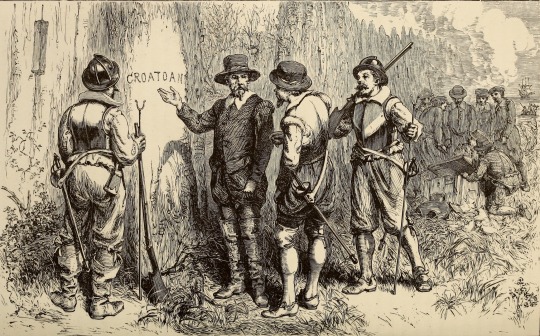
Roanoke.
The establishment of the Roanoke Colony (/ˈroʊənoʊk/ ROH-ə-nohk) was an attempt by Sir Walter Raleigh to found the first permanent English settlement in North America. The English, led by Sir Humphrey Gilbert, had briefly claimed St. John's, Newfoundland, in 1583 as the first English territory in North America at the royal prerogative of Queen Elizabeth I, but Gilbert was lost at sea on his return journey to England.
Roanoke colony was founded by governor Ralph Lane in 1585 on Roanoke Island in what is now Dare County, North Carolina, United States.[1](pp 45, 54–59) Lane's colony was troubled by a lack of supplies and poor relations with the local Native Americans. While awaiting a delayed resupply mission by Sir Richard Grenville, Lane abandoned the colony and returned to England with Sir Francis Drake in 1586. Grenville arrived two weeks later and also returned home, leaving behind a small detachment to protect Raleigh's claim.[1](pp 70–77)
Following the failure of the 1585 settlement, a second expedition, led by John White, landed on the same island in 1587, and set up another settlement. Sir Walter Raleigh had sent him to establish the "Cittie of Raleigh" in Chesapeake Bay. That attempt became known as the Lost Colony due to the subsequent unexplained disappearance of its population.[1](pp xx, 89, 276)
During a stop to check on Grenville's men, flagship pilot Simon Fernandes forced White and his colonists to remain on Roanoke.[1](pp 81–82, 89) White returned to England with Fernandes, intending to bring more supplies back for his colony in 1588.[1](pp 93–94) The Anglo-Spanish War delayed White's return to Roanoke until 1590,[1](pp 94, 97) and upon his arrival he found the settlement fortified but abandoned. The cryptic word "CROATOAN" was found carved into the palisade, which White interpreted to mean the colonists had relocated to Croatoan Island. Before White could follow this lead, rough seas and a lost anchor forced the mission to return to England.[1](pp 100–03)
The fate of the approximately 112–121 colonists remains unknown. Speculation that they had assimilated with nearby Native American communities appears in writings as early as 1605.[1](pp 113–114) Investigations by the Jamestown colonists produced reports that the Roanoke settlers had been massacred and stories of people with European features in Native American villages, but no hard evidence was produced.[1](pp 116–125)
This relates to our project because we have 2 Colony’s ships going into space to find a new planet to live on. The first one finds a planet and takes some lovely pictures for their photo album, but something might happen to them, they might all get either killed by the animals on that planet or the atmosphere might drive them insane to the point they either kill each other of kill the self’s. Either easy they could end up mysteriously disappearing just like the Colony of Roanoke.
0 notes